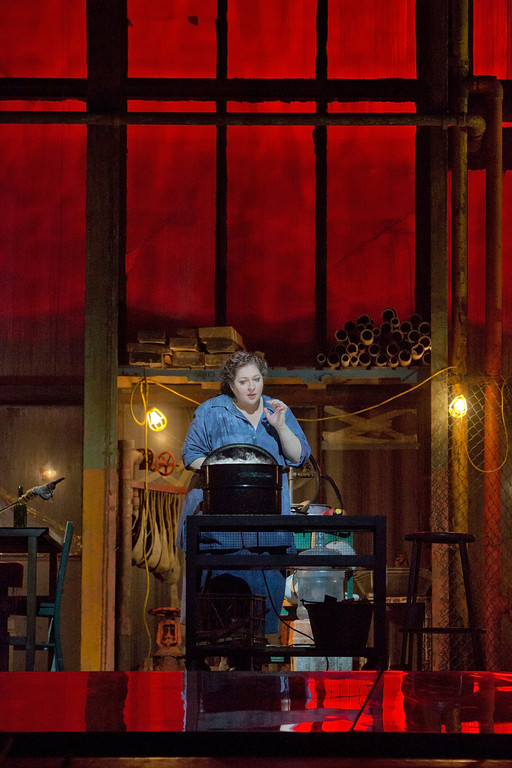Christine Goerke moves heaven and earth in Met’s “Die Frau ohne Schatten”

Christine Goerke as the Dyer’s Wife in Richard Strauss’s “Die Frau ohne Schatten” at the Metropolitan Opera.
Photo: Ken Howard
Of all the Strauss-Hofmannsthal collaborations, Die Frau ohne Schatten has to be the most opaque. Even the plot is difficult to summarize without going into symbolic analysis: The Empress of a mythical realm, who has no shadow (read: cannot bear children), learns that if she cannot acquire one in three days, her husband will turn to stone and her demonic father will take her back. She finds a mortal woman (the wife of Barak the dyer) who is willing to surrender her shadow, but when she has the opportunity to claim it by drinking from the fountain of eternal life (still following?) she refuses to ruin another woman’s life for her own gain, at which point she is rewarded for her compassion with a shadow of her own.
Herbert Wernicke certainly understood this opera better than most. His 2001 production returned to the Met on Monday night, and seldom has a revival felt so fresh. This staging recognizes and embraces the challenges of Hofmannsthal’s libretto, and allows it simply to be what it is: complicated, mystifying, and spectacularly beautiful.
In Wernicke’s concept, the Emperor and Empress rule over an ethereal plane represented on the stage by a mirrored tunnel. It is remarkable how much is accomplished here using only scrims and lighting (it’s hard to remember a time when computer projections weren’t the industry standard). In the mirror-world, the various characters have strongly evocative auras that light up the set. The stunning pink-and-blue diffusion that accompanied the Empress’s first entrance gave the audience a sense of what life might be like on the inside of a jellyfish.
When the time comes to journey into the mortal realm, the entire set rises up to reveal a dreary warehouse that serves as the dyer Barak’s home and workplace. The contrast between the two settings is striking—where the upper plane is blindingly radiant but physically spare, the dyer’s workshop is fully and realistically furnished but lit only by overhead factory lights.
One of the central images of this production is the wounded falcon, represented onstage by the dancer Scott Weber. Clothed in shreds of blood-red fabric, his lurches, twirls, and flips suggest a constant, pathetic struggle to take flight. The soprano Jennifer Check supplied the falcon’s chill, foreboding voice, and Jerry Grossman accompanied the dance sequence near the top of the second act with a haunting cello solo.
In the role of the Empress—the “Frau” of the opera’s title—was the soprano Anne Schwanewilms, in her company debut. Though singing in her native tongue, she did not put a lot of dramatic conviction behind her words, resorting to cape-twirling diva gestures. She has, however, a bright and lucid tone, which she used to great effect: Her cascading monologue just before she went to meet her father was breathtaking, moving through a range of emotions and colors.
As her Emperor, the tenor Torsten Kerl had a creamy tone with ringing top notes, and brought out the internal struggle of his act two monologue, as he believed himself betrayed by his wife but realized he did not have the heart to kill her.
As Barak the dyer, Johan Reuter was wonderfully sympathetic, and had a full, woody tone. His earnestness throughout was affecting, and he absolutely came to life in the first scene of act two, when he brought home a gaggle of children and joyfully gathered them around his table.
Ildikó Komlósi was a dark, grating, malicious nurse. Her greatest dramatic turn came before the gates of Keikobad, as she watched her plan unravel and frantically tried to rescue the situation.
The greatest revelation of the evening was the soprano Christine Goerke’s performance as the Dyer’s Wife. Monday was certainly not a house debut for her, but it was in any event a triumphant return home. She had everything working for her: her voice was at times searing, at times velvety, at times earthy—to try to ascribe a single quality to her singing would be foolish. She had no trouble filling the cavernous auditorium of the Met, and there was spectacular depth to her tone, no matter where she was in her range.
She excelled dramatically, as well. With the amount of hectoring that she gives her husband over the course of the first two acts, it’s easy (and not uncommon) for this character to turn into something of a nag. Goerke avoided that trap on her way to a moving portrayal of a frustrated but loving wife. The tenderness and vulnerability she showed in her remorseful monologue at the top of the third act made for one of the highlights of the evening—but then, practically every moment she was onstage was a highlight. From beginning to end, she gave an astonishing and thoroughly memorable performance.
Vladimir Jurowski’s conducting grew stronger as the night went on. In the first act he seemed a bit square. Strauss’s music has a way of spilling out of itself, constantly expanding, but the interpretation early on seemed too regimented.
He hit his stride, though, in the second act, finally channeling a rich, dark, Straussian sound from the orchestra and digging into the score with more muscle. In the third act he found even more flair, bringing electric energy to the group scene before the gates of the Empress’s father Keikobad.
Die Frau ohne Schatten runs through November 26. metoperafamily.org